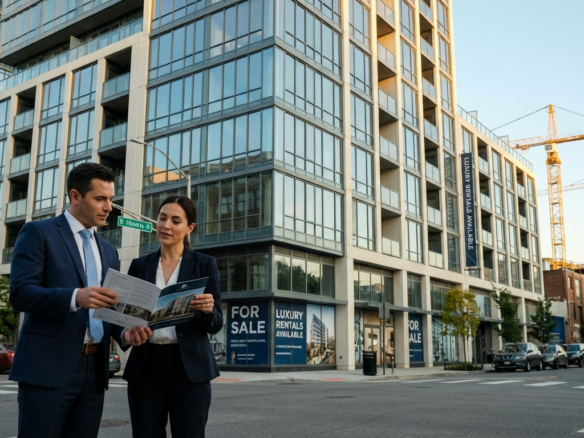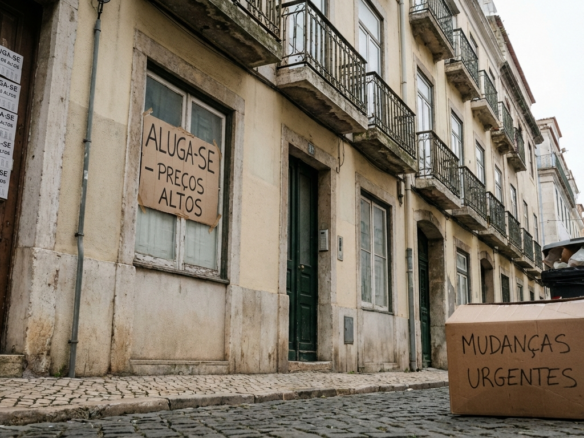Where French Property Prices Are Falling in 2025: A Buyer’s Guide to France’s Most Affordable Markets
The French property market is experiencing a fascinating shift in 2025, with prices falling in several towns and cities across the country. For prospective buyers who’ve been watching the market from the sidelines, this could be the opportunity you’ve been waiting for. Recent data shows that while major metropolitan areas like Paris continue to command premium prices, numerous smaller towns and even some mid-sized cities are seeing significant price corrections. Understanding where these price drops are happening and what’s driving them can help you make a smart investment decision in one of Europe’s most desirable property markets. Whether you’re a first-time buyer looking for an affordable entry point or an experienced investor seeking value, France’s changing property landscape offers compelling opportunities worth exploring.
Get 50% OFF!
Subscribe to our newsletter and enjoy a 50% discount on all listing packages, no strings attached!

Where French Property Prices Are Falling in 2025
The latest market analysis reveals that property prices are declining in several distinct regions across France, with some areas experiencing drops of up to 10% year-on-year. Towns in the Occitanie region, parts of Nouvelle-Aquitaine, and certain areas in the Grand Est have seen the most significant corrections. Cities like Perpignan, Limoges, and Mulhouse are among those where buyers can find properties at considerably lower prices than just 18 months ago. These price drops aren’t uniform across France, creating a patchwork of opportunities for savvy buyers who know where to look.
The reasons behind these falling prices vary by location but generally stem from a combination of factors including rising interest rates, reduced buyer demand following the post-pandemic property boom, and local economic conditions. Some towns that saw speculative price increases during the remote work boom are now correcting as workers return to offices. Additionally, areas with aging populations and limited job opportunities are experiencing sustained price pressure. Understanding these local dynamics is crucial for buyers trying to distinguish between a genuine bargain and a property in a declining area with limited future appreciation potential.
Understanding the Current French Housing Market
The French property market in 2025 is characterized by a cooling period after several years of rapid growth. Interest rates have risen significantly from their historic lows, with mortgage rates now hovering around 4-5% for most borrowers. This has substantially reduced purchasing power for many buyers, particularly first-time purchasers who are most sensitive to monthly payment increases. The French government’s lending restrictions, which limit mortgage payments to 35% of household income and loan terms to 25 years, have further tightened the market by reducing the number of qualified buyers.
Despite these challenges, France remains an attractive market for international buyers, particularly those from the UK, Belgium, and the Netherlands. The French notaire system provides excellent buyer protection, and property ownership laws are well-established and transparent. Foreign buyers should be aware that purchasing costs in France typically add 7-8% to the property price for older properties (including notaire fees, registration taxes, and land registry fees) and 2-3% for new builds. These costs are higher than in many other European countries, so factor them into your budget calculations from the outset. Additionally, if you’re planning to rent out your French property, you’ll need to understand the local tax implications, including the taxe foncière (property tax) and potential income tax obligations.
Key Market Indicators to Watch
- Transaction volumes: Down approximately 20% compared to 2022 peak levels
- Average days on market: Increased from 60 to 90 days in many regions
- Price negotiations: Buyers achieving 5-8% discounts in falling markets
- Mortgage approval rates: Tightened significantly due to lending restrictions
- Foreign buyer activity: Remained stable, particularly in rural and coastal areas
Best Bargain Areas for Property Buyers in France
The Occitanie region, particularly around Perpignan and Nîmes, offers some of the best value for money in southern France. Properties here have dropped 5-8% in value over the past year, making Mediterranean living more accessible. You can find two-bedroom apartments in Perpignan for under €100,000 and village houses with character for €150,000-200,000. The region benefits from excellent weather, proximity to Spain, and improving transport links, though job opportunities outside tourism and agriculture can be limited.
In central France, Limoges and the surrounding Haute-Vienne department present excellent opportunities for buyers seeking space and tranquility. Property prices here have fallen by approximately 6% year-on-year, with substantial family homes available for €150,000-250,000. The Nouvelle-Aquitaine region more broadly offers good value, particularly in towns like Angoulême and Périgueux. These areas appeal to buyers seeking a slower pace of life, but you should carefully consider accessibility if you need regular travel to major cities. The Grand Est region, including towns like Mulhouse and Metz, has also seen price corrections of 4-7%, offering good value for buyers who don’t mind being further from the coast.
Price Comparison: Falling vs. Rising Markets
| Town/City | Region | Average Price per m² | Year-on-Year Change | Typical 3-Bed House |
|---|---|---|---|---|
| Perpignan | Occitanie | €1,850 | -7.5% | €185,000 |
| Limoges | Nouvelle-Aquitaine | €1,420 | -6.2% | €165,000 |
| Mulhouse | Grand Est | €1,680 | -5.8% | €195,000 |
| Bordeaux | Nouvelle-Aquitaine | €4,200 | +2.1% | €485,000 |
| Lyon | Auvergne-Rhône-Alpes | €4,850 | +1.8% | €565,000 |
| Paris | Île-de-France | €10,400 | +0.5% | €1,200,000+ |
What These Price Drops Mean for Your Investment
Falling property prices present both opportunities and risks that buyers need to carefully evaluate. On the positive side, lower prices mean improved affordability and better negotiating power. If you’re planning to use the property as a primary residence or long-term vacation home, short-term price fluctuations matter less than finding the right property in a location you love. Many of the areas experiencing price drops offer genuine lifestyle benefits including space, natural beauty, and lower living costs. For buyers with a long-term perspective (10+ years), current price corrections may represent excellent entry points into the French market.
However, it’s essential to distinguish between temporary market corrections and structural decline. Some areas are experiencing price drops because of fundamental issues like population decline, limited employment opportunities, or poor infrastructure. Before buying in a falling market, research local economic development plans, population trends, and infrastructure investments. Properties in towns with good transport links, universities, hospitals, and diverse employment are more likely to recover value than those in isolated areas with aging populations. Consider rental potential even if you don’t plan to rent immediately, as this indicates underlying demand. Working with a local estate agent who understands the specific market dynamics of your target area is invaluable for making informed decisions.
Practical Tips for Buying in Falling Markets
For First-Time Buyers:
- Start with a clear budget including all purchase costs (remember the 7-8% additional fees)
- Get mortgage pre-approval before house hunting to understand your true purchasing power
- Consider areas with good rental potential as a safety net
- Don’t overextend financially, even if lower prices are tempting
- Visit the area multiple times, in different seasons if possible
For Experienced Investors:
- Look for areas with planned infrastructure improvements or economic development
- Diversify across multiple properties rather than putting everything into one falling market
- Calculate rental yields carefully, accounting for French tax obligations
- Consider the implications of French inheritance laws if buying through an SCI (property company)
- Factor in renovation costs, which can be higher in France than other European countries
Understanding French Property Regulations
France has specific regulations that affect property buyers, particularly regarding energy efficiency. The DPE (Diagnostic de Performance Énergétique) rates properties from A to G, and new regulations are gradually phasing out the rental of poorly performing properties. Properties rated F or G (the least efficient) will be banned from rental markets by 2028, which could affect resale values. If you’re considering a property with a poor energy rating, factor in renovation costs to improve efficiency.
Additionally, if you’re buying in a copropriété (apartment building or complex with shared areas), you’ll need to review the building’s financial health and any planned major works. French law requires sellers to provide extensive documentation about the property’s condition, including surveys for asbestos, lead, termites, and other potential issues. This transparency protects buyers but means you should carefully review all documentation, ideally with help from a bilingual lawyer or property specialist.
Frequently Asked Questions
How much should I negotiate on a property in a falling market?
In areas where prices are declining, buyers are typically achieving 5-8% discounts from asking prices. However, this varies significantly by property and location. Properties that have been on the market for over 90 days or those requiring renovation work offer the most negotiating room. Start with a reasonable offer based on recent comparable sales in the area, which your estate agent can provide.
Are falling property prices in France a sign of a market crash?
No, the current price corrections represent a normalization after the exceptional growth during the pandemic years rather than a crash. The French market is adjusting to higher interest rates and tighter lending conditions. Most experts predict stabilization rather than dramatic further declines, though this varies by region.
Can I get a mortgage as a foreign buyer in France?
Yes, but it’s more challenging than for French residents. French banks typically require a 20-30% deposit from foreign buyers and will scrutinize your income carefully. Some international buyers find it easier to secure mortgages in their home countries. Mortgage brokers specializing in foreign buyers can be extremely helpful in navigating this process.
What are the ongoing costs of owning property in France?
Beyond the mortgage, expect to pay taxe foncière (property tax, typically €800-2,000 annually for an average house), taxe d’habitation in some cases, building insurance (€300-600 annually), and utilities. If you’re in a copropriété, you’ll also pay service charges. Budget approximately 1-2% of the property value annually for maintenance and unexpected repairs.
Is now a good time to buy property in France?
For buyers with secure financing and a long-term perspective, the current market offers good opportunities, particularly in areas where prices have corrected. The key is choosing locations with solid fundamentals rather than simply chasing the biggest price drops. If you’re planning to use the property regularly and can afford the purchase comfortably, market timing becomes less critical than finding the right property in a location you love.
What happens if property prices continue to fall after I buy?
Property investment should always be viewed long-term, particularly in France where transaction costs are high. If you’ve bought in an area with good fundamentals and you’re using the property as a home rather than a short-term investment, temporary price fluctuations shouldn’t significantly impact your enjoyment or long-term financial position. Avoid overleveraging yourself so that you’re not forced to sell during a market downturn.
The current French property market presents genuine opportunities for buyers willing to look beyond the obvious hotspots and do their homework. While falling prices in certain towns and regions might initially seem concerning, they often reflect market corrections rather than fundamental problems, creating entry points for smart buyers. The key to success is thorough research, understanding local market dynamics, and taking a long-term perspective on your investment. France’s robust legal framework, transparent transaction process, and enduring appeal as a place to live make it an excellent choice for European property buyers. Whether you’re drawn to the sunny south, the rural heartland, or the historic towns of the east, there’s never been a better time to explore what falling prices can offer. Just remember to factor in all costs, understand the regulations, and choose a location that aligns with your lifestyle goals rather than simply chasing the biggest bargain. With careful planning and realistic expectations, buying property in France’s more affordable markets can be both a sound financial decision and the start of an exciting new chapter in your life.





Join The Discussion